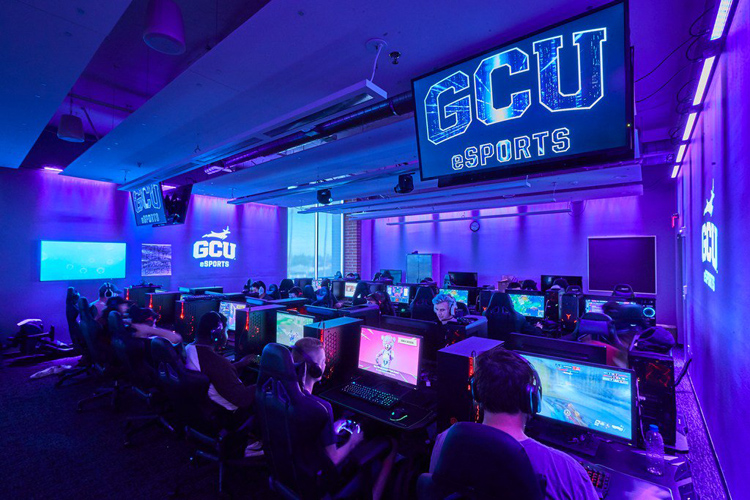Arizona State and Arizona are regarded as the pillars of collegiate athletics in the state, and the same is proving true in collegiate esports. Both schools recently showed their potential at the inaugural Arizona Esports Collegiate Cup at the Arizona State Fair.
The Sun Devils defeated the Wildcats for first place in that tournament, but while ASU and Arizona may have the best Overwatch teams right now, their team leaders agree that it is Grand Canyon that is setting the standard for overall esports programs in the state.
Credit Albert Lee, GCU’s esports coordinator, for setting a high bar. Since he was hired to lead the school’s esports initiative in August 2018, he has overseen the construction of a massive esports arena and the implementation of new scholarships for the program’s most important teams. Creating these resources for the school’s 19 teams, Lee said, is new territory.
“We are in the Wild West phase of collegiate esports,” Lee said. “GCU took the initiative to try to be a pioneer in this space.”
Despite GCU’s investment in their esports program, it isn’t the only Arizona school to produce nationally recognized teams. The Sun Devils rose to prominence first after winning Heroes of the Dorm 2016, a national Heroes of the Storm competition that was modeled after the NCAA’s basketball tournaments. Then, Arizona won Tespa’s 2018 Collegiate Rocket League National Championship.
Most recently, in its first year with official funding, GCU was the only Arizona school to reach the 2019 Overwatch National Championship, shocking the No. 1-ranked team at the time, California-Irvine. Still, Lee said there’s still much he can learn from the success of GCU’s in-state competition.
“From a community standpoint, I really admire the programs at ASU and UofA,” Lee said. “We are lucky here at GCU to have university support. I’m impressed by what ASU and UofA have accomplished without it.”
Lee nailed what makes teams without institutional support function, according to Liam Koenneker, president of Arizona Esports. He said it’s the community that makes UA’s teams stand out.
“We focus heavily on our community at the University of Arizona,” Koenneker said. “We are over 70% casual gamers. The competitive side is actually the minority. However, we have proven that we can get our competitive clubs to compete on a high level without university backing.”
Although ASU and Arizona’s esports clubs host well-attended events throughout the year, neither receive support like GCU does. There are no scholarships, no director, and ASU only recently gained access to a practice room. Regardless, Jacob Matson, president of the ASU Esports Association, believes that in terms of strength, ASU is No. 1 in the state.
Matson’s claim has some legitimacy, since ASU is nationally ranked in nearly every esport it competes in. While they didn’t make it to the Overwatch National Championships last year, the Sun Devils only barely missed out with a ninth-place finish. ASU’s League of Legends team was also ranked in the top 10 nationally. That success doesn’t change the way Matson admires GCU, though.
“GCU is down the street and they have a huge practice facility, they are hiring coaches, their Overwatch team went to the national championship finals last year,” Matson said. “There is a lot going on down the street that I hope we get a chance to do in the near future.”
In fact, Matson said he believes Arizona schools will become a staple of collegiate esports five years from now.
“Slowly, people are going to be afraid to play Arizona like they are afraid of California right now,” Matson said. “We are the diamond in the desert. People are going to say, ‘We don’t want to play ASU; give us the UCI matchup instead.”
There is more than one collegiate esports program in Arizona with institutional support, however. Benedictine University, a small private university in Mesa, has an even newer esports program than GCU’s. Instead of building an arena of their own, BenU uses Pure Esports, a venue owned by the program’s newly hired director, Daniel Artt. As the newest program in the state, Artt said he wants to join the way ASU and GCU learn from each other.
“I admire ASU’s program talent wise – they damn near have a semi-pro team over there,” Artt said. “I also admire GCU for their investment. They built a very expensive facility on their campus. I should know because I’ve bought that stuff before, so it’s very admirable they are willing to invest in their students.”
Artt said BenU plans to combine ASU’s talent with GCU’s investment to create the best of both worlds. In time, Benedictine plans to reach the same heights as its peers throughout the state.
Story by Warren Younger, Cronkite News




